Future Of The Left create a distinct and individual brand of punk rock: sarcastic, humorous, joyously aggressive, full of vehement absurdism. Lead singer/songwriter Andy “Falco” Falkous and drummer Jack Egglestone were once 2/3 of the revered group Mclusky. When Mclusky split in 2005, Falco and Egglestone joined forces with bass player Kelson Mathias and formed Future Of The Left. Five years and two albums later, Mathias departed and the band was joined by the duo of Juila Ruzicka (bass) and Jimmy Watkins (guitar). This new line-up released an EP last year, unleashed their latest full-length album in June, and are currently embarked on a US tour.
We caught their show at Europa in New York City this past June, and had a chance to sit down and talk with them the following day.
Falco is obviously the frontman – onstage, his carefully-clipped-syllables and gut-wrenching shouts cut through the wall of electric noise that the band delivers. Julia is a rock-solid presence stage left, twisting to and fro as she wrings songs’ outlines from her bass. Jack is a monster behind the drum kit, thrashing away with abandon, keeping time, accentuating melodies, pushing everything forward. And Jimmy is the perfect foil for everyone else, equally concentrated on his guitar and keeping an eye on the audience, dropping in vocals as needed, swaggering and stomping, shaping the show, cracking jokes, interjecting as needed.
Q: The Cliffs Notes description of FOTL usually boils down to a variation on “a cult band formed from the ashes of a cult band”, which is cute, but…
Falco: …It’s two degrees of separation from anything anyone knows or gives a fuck about. I always say ‘rock band’, which sounds kinda glib, almost… It’s really difficult to be involved in music for so long, and make music for so long and still have to describe it to people, because the music, I would hope, describes itself. I would just say it’s loud rock music, and it’s not stupid. Y’know, it doesn’t slip into those tropes that characterize rock and roll necessarily. I’ve known a lot of people in rock bands who were well-rounded people with impeccable taste in comedy, film, authors, newspapers, the friends they choose to have – but when it comes to the rock music they play, it’s almost like everything is distilled through the eyeglass of ‘what rock and roll should be’ – it’s like they lose the special features which make them unique individuals.
First, as a band, we want the music to represent us as people. Without having that plan, because if you make the music in the right way, you don’t need to have that plan… it’s simply what happens.
Q: How do you manage to do that without getting too self-important or serious?
Falco: I mean, you just don’t. I mean, again a lot of the way everything works is, it just works self evidently. I can only think in terms of making this album, maybe one or two occasions where a discussion had to be had about the relative benefits of a song or where it should go on the record or what should happen next, because… Things that work, self-evidently work. And the things where it sounds like you’re trying too hard, maybe, that’s either lyrically or musically – we try not to overly festoon our stuff with a strange time signature at the end of a song, say, but it has to be something that makes sense in the context of a song as opposed to crowbarring it and saying ‘see, we can play in this way’. And lyrically as well, there are ways of making points without sounding as if you’re stood on a pulpit sermonizing to people.
Q: It seems like a lot of those people start out wanting to be rock stars, so they proceed from that assumption…
Falco: Well, I definitely started off wanting to be a rock star, but for me, I think I was confused as to what the whole thing involved. For me, great bands are about personalities, y’know – even when a song doesn’t work, the strength of a personality can make it either ridiculous or galling or REALLY HATEFUL sometimes – even with bands you love, there’s gotta be that occasional song which makes you want to strangle ’em. And that’s the essence of great art.
Q: So, then… Do you find that music is a way to distill all those influences into a single thing?
Falco: Again, I don’t think that much thought goes into it, for any of us. It’s almost like a reflex. I mean, obviously making music is an artifice in the sense that you have to choose to learn to play an instrument and then… and this is why sometimes when you hear about bands who – you have this crazy guy who deliberately traveled to a city and did a soundcheck and plugged his guitar in and tuned it and sung deliberately in a mic to be crazy… It’s such a particular route, it’s not crazy.
Q: You pay a lot of attention paid to your your presentation, the graphics, the videos… You don’t seem to just hand them off and let other people determine them for you.
Falco: We don’t… We have as much control as budget allows.
Julia: Time and money is a factor. If we had a bit more budget, I’m sure…
Falco: I’m sure, ironically enough, if we had more money we’d be less successful. We’d be paying heed to even less conventions.
Q: I hope doing this interview won’t be counterproductive, getting publicity…
Falco: Goddamnit, you’ve seen through our ruse!
Falco: Touring the states, there is something dirtily glamorous about it. Even for someone that’s ironically removed from it a little, there’s something more exciting about a truckstop somewhere in Nevada… There’s something about it that just lends itself more to the romance of a band on the road.
Q: And yet, it seems like there’s not the concentration on ‘breaking America’ that there used to be. It’s an ethic and cliche that’s fallen by the wayside…
Falco: It has a little. Just the reach that the internet gives, that you can already break America using other devices, and then you can go to America in order to – consolidate financially, I suppose. But more commonly, from people I know in bands, especially British bands that go over and do low-budget tours, America tends to break them, rather than the other way around. Even if they do enjoy some of the local beers… And what is a ‘light beer’? What sort of person can’t decide what sort of beer they’re going to drink? Drink a beer!
Q: The Amazon.com version of the new record has three extra tracks, there was also the ‘Polymers Are Forever’ EP. Are those things that came out of the album sessions, or are they stand-alone work?
Jack: They’re from Australia.
Falco: The three bonus tracks on the Amazon are from some recordings we did with a friend, Lachlan Wooden, in Melbourne when we had a day off between shows. Basically, the whole idea was we wrote and recorded three songs. One of the songs was kind of, kind of written before. The other two songs were written on the day. So it was – not an experiment – a fun exercise.
Julia: Something quite loose, and raw, and fun to do.
Falco: It’s something where the album sessions, inasmuch as we didn’t spend a long time making the record altogether, it was sixteen days… As enjoyable as it was, and I don’t’ think I’d change a note, there’s so much pressure involved. Pressure from ourselves as opposed to meeting the needs of a corporation, even though we’re sat in this office at the minute. Which, believe me, is far away from our normal climes. And there was something about writing those songs in that way – I won’t say it was liberating, ’cause you can choose to do that whenever you’d like, but it was a nice counterpoint to the record. It’s like “here’s just some raw shit that we threw together” in the time if took to drink some of Lachlan’s homemade beer – Lachlan being spelled L-A-C-H-L-A-N by the way, because that’s a name that could be misspelled in a variety of spectacular ways.
Q: Most press seems to focus on you, Falco, as the focal point and guy who’s spitting all the lyrics, but really, what is your process? Does he just bring in something and order you around?
Jack: Noooo! We just… Get more people in the room, see what happens.
Juila: It’s just like… Jack will be dicking about on his kit, if he comes up with a good beat, y’know, we’ll work with that, add to that. Or I’ll have a bassline, Jim will have a riff… Yeah, it’s collaborative, but there’s quite a lot of direction from yourself [gesturing toward Falco] ’cause you have quite a strong vision.
Falco: Generally speaking, everyone has their musical ability, and I hear things in parts people play… Usually with Jack, it’ll be a drumbeat, and I might ask him to take just one tom hit out of it or whatever. ‘Cause the one thing which is very enjoyable about writing with Jack, aside from the variety of stupid noises he can make at a moment’s notice, is the fact that his drumbeats are, generally speaking, quite lyrical. Almost hooks in themselves.
But ANYTHING can work. And anything gets a chance. And the process is basically “here’s something”, everybody piles on it, and if it works, if there’s a kernel of a good idea there, then you carry on. If after two minutes it’s stinking up the place, then it gets thrown in the bin.
Jack: It’s very important to record it all, though. And sometimes we’ll work on it if it if it’s working, if not we leave it for a week, month, two months…
Julia: We never sit on anything for too long.
Falco: But there were some songs, there’s adeadenemyalwayssmellsgood off the first record. That riff existed for about nine months before it was a song, but it was self-evidently such a good piece of music that it needed a vocal to weld it all together. That didn’t happen at first. But we don’t always give parts that kind of respect. Usually, if it doesn’t work, if it’s not a song… No matter how good a riff is – Jim writes a lot of good riffs which simply don’t work in terms of a wider song. And it’s a shame, ’cause as a piece of music it’s fantastic, but if it doesn’t inspire a song and a melody than it’s useless.
Q: I’ve seen many bands shuffle their line-ups – you changed things around, went from three people to four before this new record, and somehow seem more focused.
Falco: Well, it’s usually the death knell of a band, isn’t it? Either when they add keyboards, or get an extra guitarist it usually is. It’s the ‘we’re running out of ideas’. But I had MORE ideas, that was the point. And we needed to find a way to get to it. Originally, when Kelson said he didn’t want to do the band anymore, or rather, on a full-time basis… He wanted us to do it as a more occasional enterprise, do the occasional tour of Australia, and so Jack and me went away to think about it, but in the interim…
Jack: We continued jamming, just me and you.
Falco: And we asked Jim to write some songs for an alternative band. That was the original idea. I’m familiar with the failings… simply replacing people isn’t the way you want it to go. But the songs we were writing sounded almost identical to Future Of The Left. And it would’ve been ridiculous to be in two bands with different names who sounded identical. ‘Cause, just by coincidence, I have exactly the same voice as the guy in Future Of The Left. The same voice, I write pretty much the same. And Jim, we didn’t want Jim to be in the band because he was a shy and retiring young folk troubadour, it was because of the loud guitararing. And then we asked Julia to join about six months afterwards.
I would refuse to stand onstage if I thought it was… It was a weak parody of what had happened before. As far as I’m concerned, it’s better. Yeah, more focused, and even more enthusiasm and more love.
Q: On your records, what many people can latch onto first are the heady aspects, the lyrics and words, the balance of, er, whimsy and fury? Is that…
Falco: Yeah, that’ll do.
Q: …But it seems like live, you manage to replace the intellectual with sheer volume.
Falco: To a degree, yeah.
Q: The first time I saw you was at that show in Williamsburg, the…
Jack: Music Hall?
Q: No, the…
Falco: Ah, the… Fish. The tiny bar that stunk of fish.
Q: Yes, and you quite literally shook the paint off the ceiling. We were all covered in like, black crap when we left.
Falco: That’s ’cause I’m allergic to seafood, you see? So I was so enraged at having to play in that locale.
But for me, they’re different formats of delivery. Like – believe me, I don’t think about it that clinically, but in reality they are. The record is a document, you can take it away, you can listen to bits and pieces. The live show is… It’s a bludgeoning assault. It’s not easy, we put a lot of work into getting it right. And the setlist is, y’know, almost scientifically assembled in order to showcase the new but still pay respect to the old. I mean, when we tour later in the year, I would hope that we can play a couple more songs from the new record – at the moment, it’s only five out of sixteen songs. But you’ve got to be careful because new songs, by their very nature – they don’t have those memories attached for the crowd as yet, will never get the same response as old songs. But we’ve been very encouraged by the response… Like the new songs got fantastic responses last night, so very very encouraged by that. Usually with a live show, when it’s a good show, nothing happens that you don’t expect. Even to the point where becoming electrocuted in the face by a mic which isn’t grounded is not surprising. But people reacting in that way to the new songs, to me was a huge surprise. A genuine and a really – a really filling moment as well. And y’know, we’re not a band or people who are prone to that kind of heartfelt sentiment.
Photos and concert review from Europa Night Club, June 17th, 2012 – interview conducted June 18th 2012. Photos © 2012 Marnie Ann Joyce. Additional photos from this event can be seen here.
Future Of The Left are now on tour – all live dates can be found here.

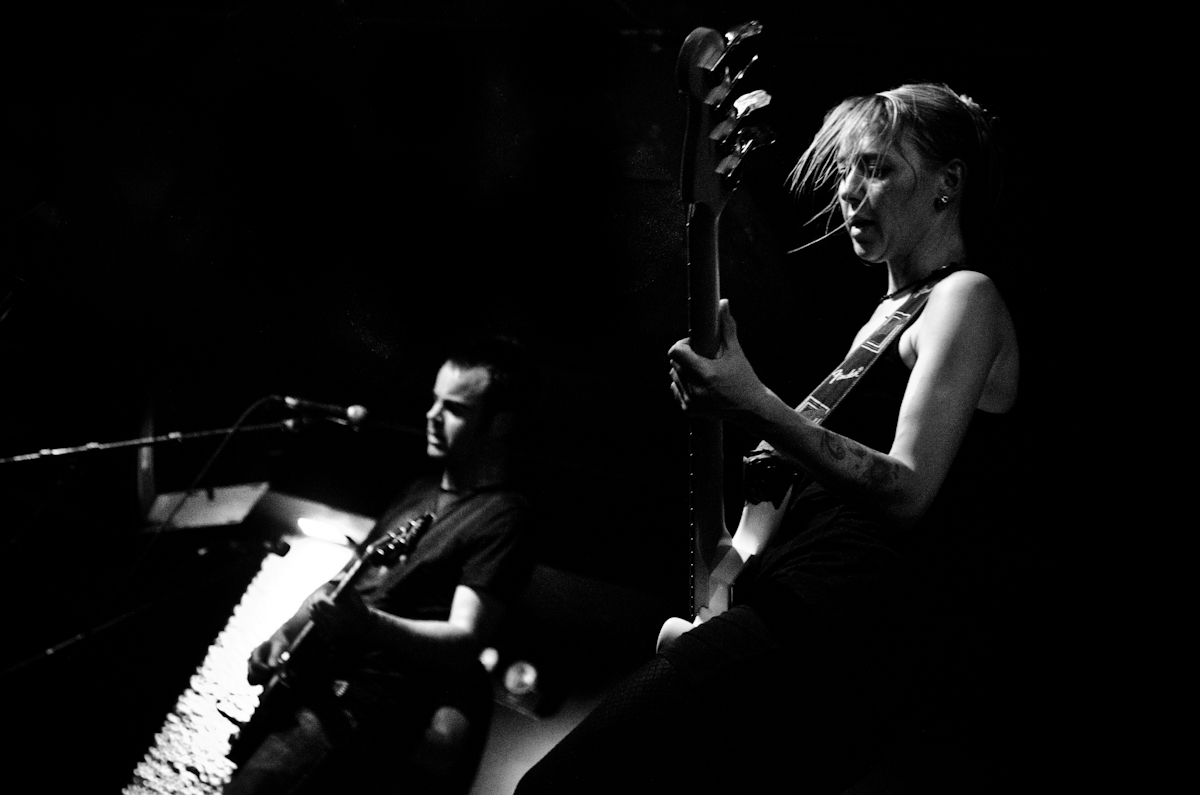
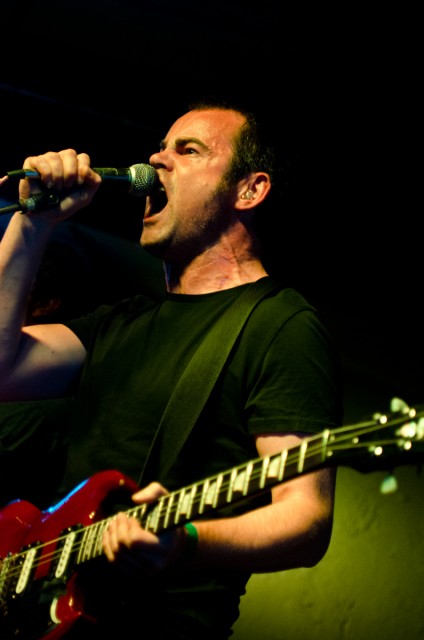
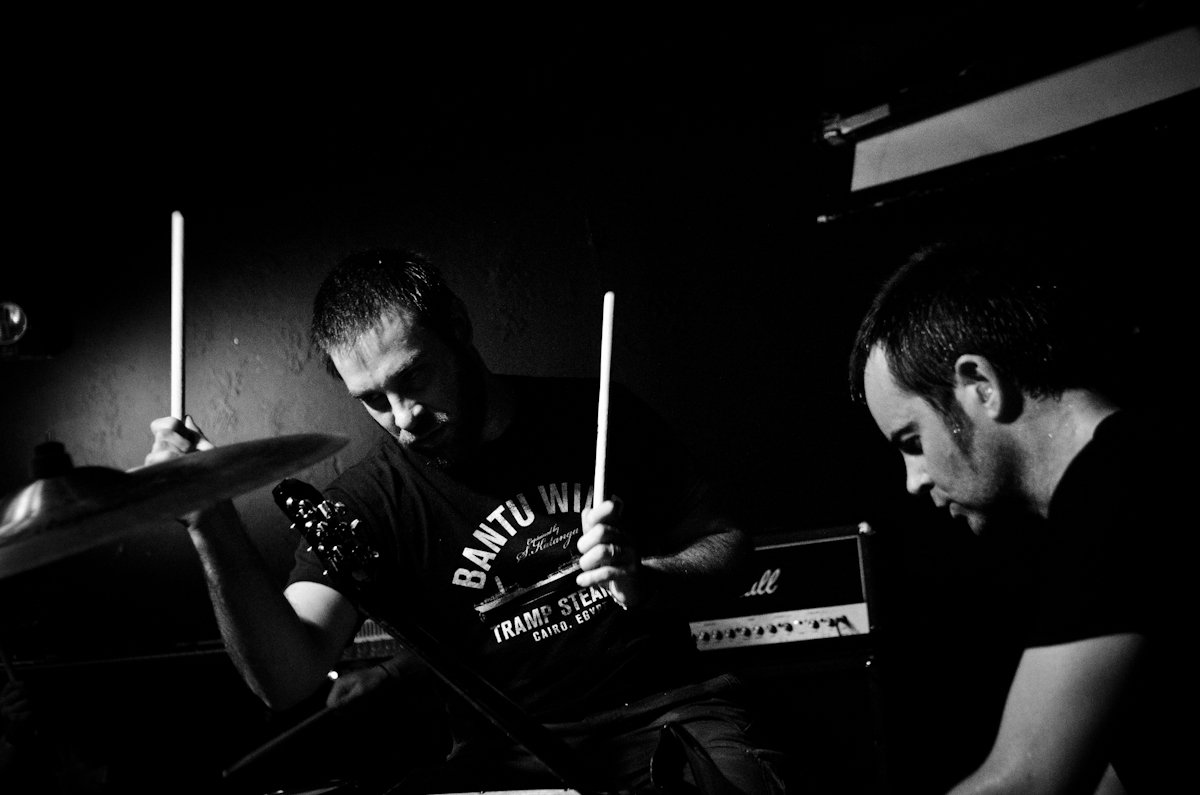
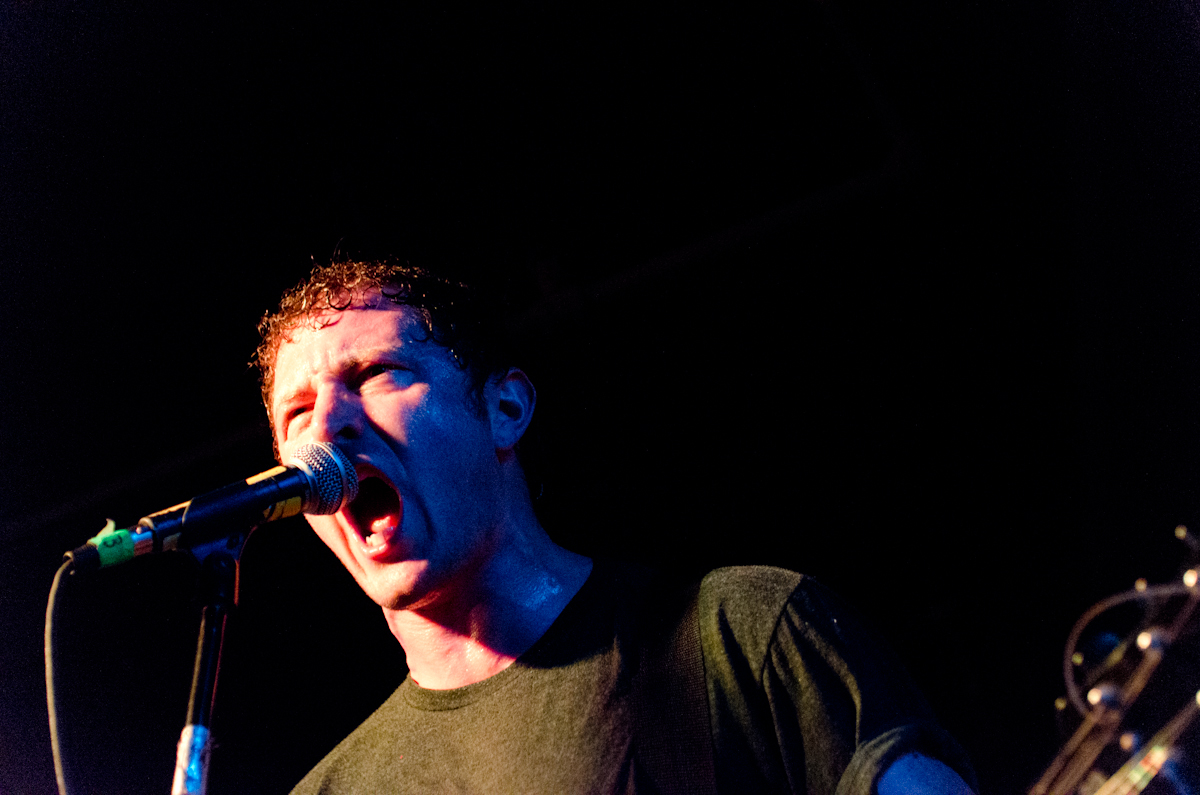
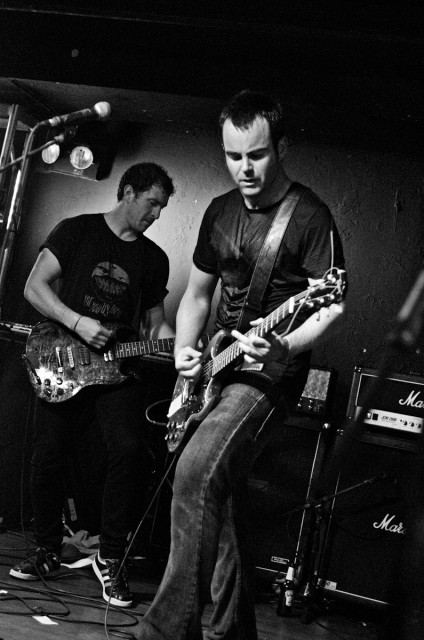
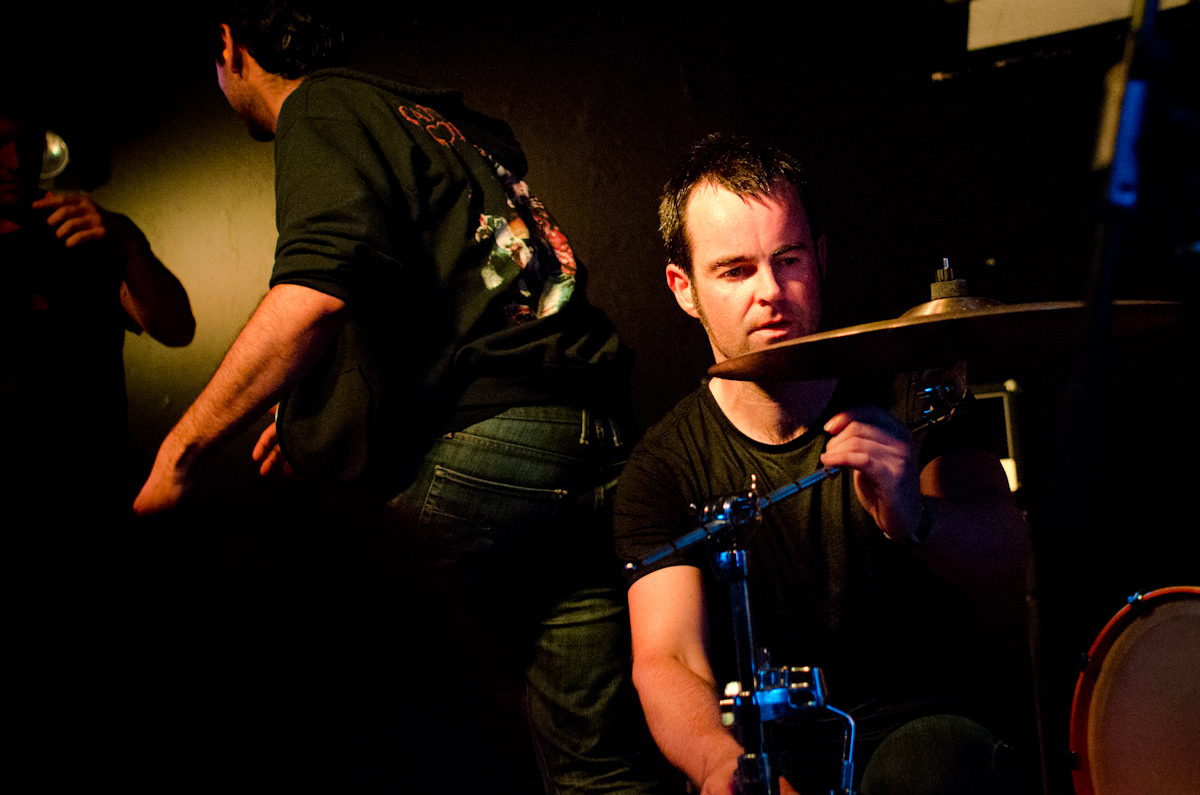
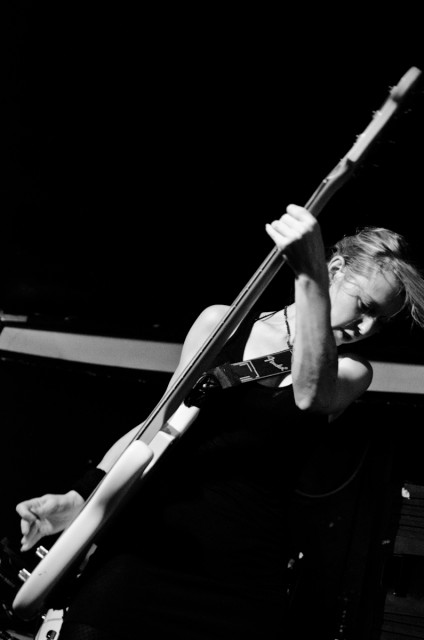
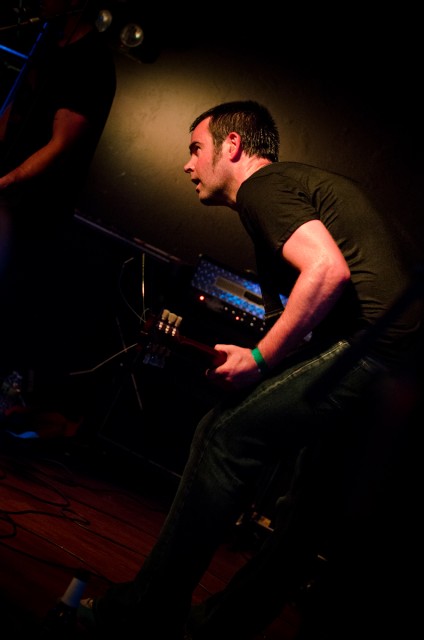
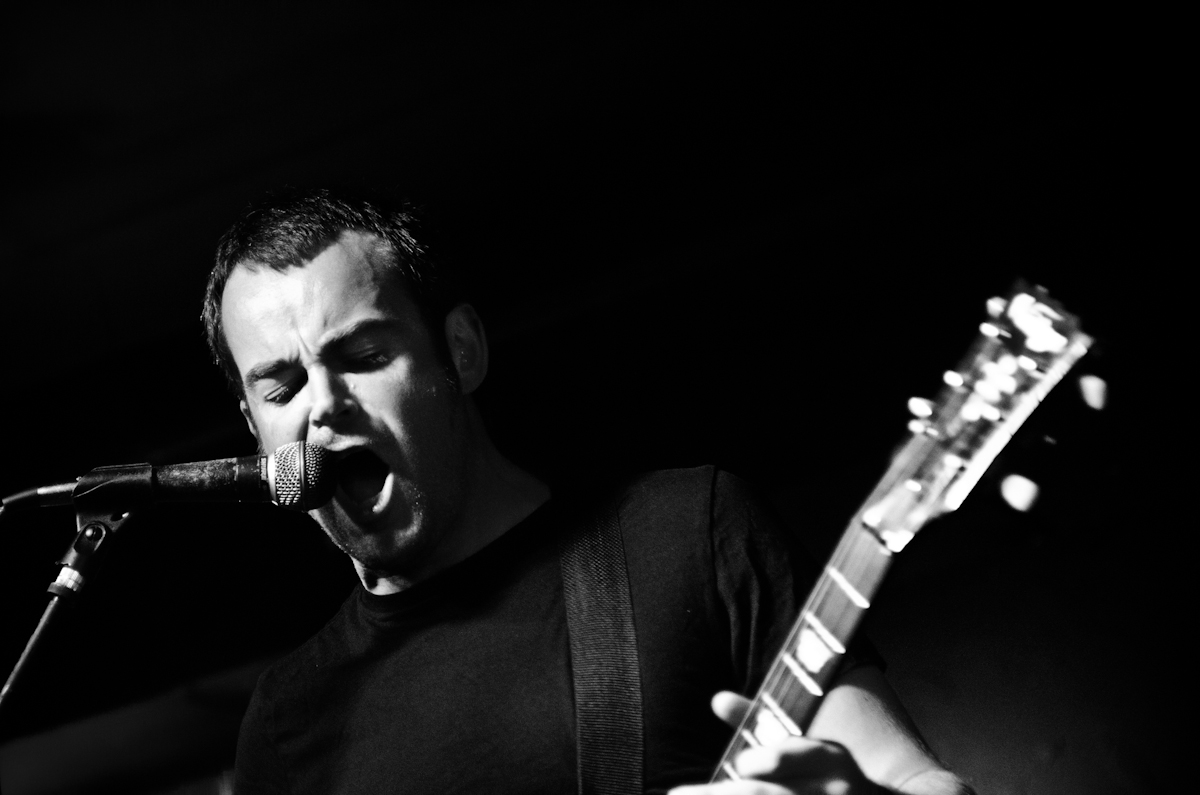
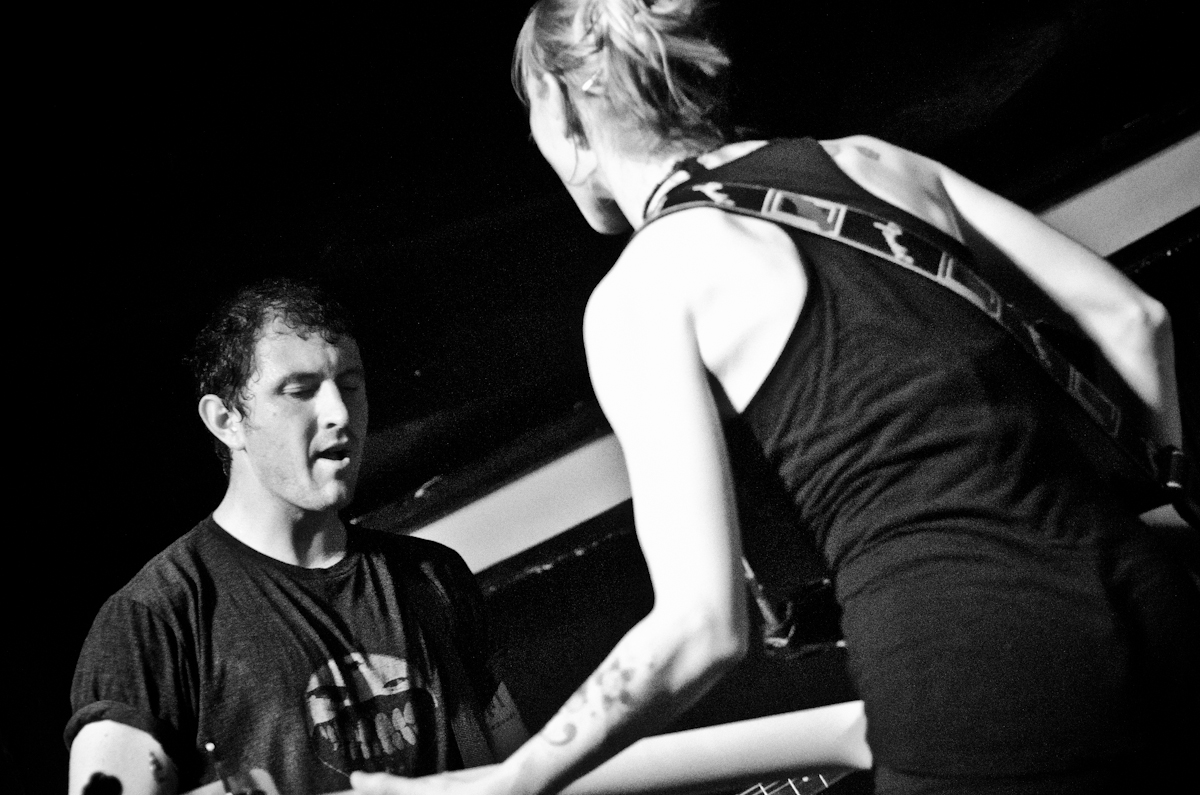
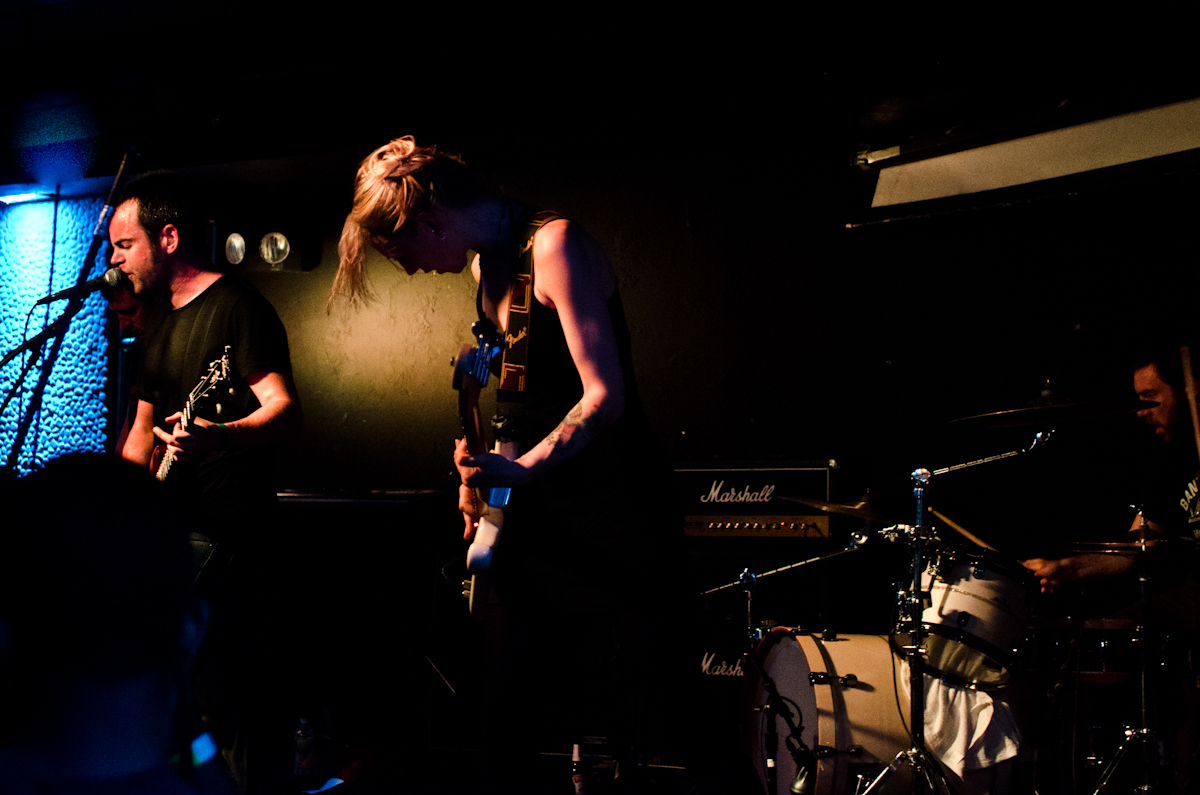
Great photos and insightful Qs..a bludgeoning assault…